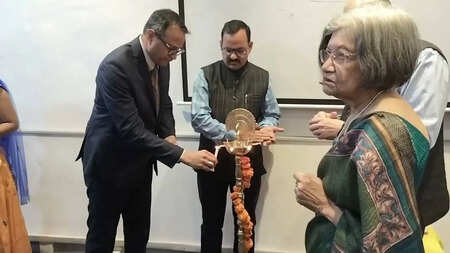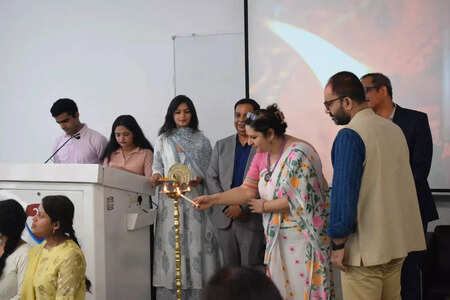National Mental Health Programmes
Times of Bennett | Updated: Mar 31, 2023 04:06

By Anjali Singh
India has the same serious concerns about mental health as the rest of the world. The emotional, social, and cognitive functioning of a person is significantly impacted by mental health problems. Around 150 million Indians, according to the National Mental Health Survey conducted in 2015–16, need some kind of mental health support. The Health Ministry of India has taken several actions to treat mental health concerns and promote a healthy lifestyle in response to this demand.
National Mental Health Survey: The National Mental Health Survey (NMHS) was introduced by the IndianHealth Ministry in 2015–16. The purpose of the survey was to evaluate the frequency and distribution of mental health problems in India. The poll helped the ministry create evidence-based policies and programmes to address mental health issues by revealing important information about their scope.
2017 Mental Healthcare Act: The Indian government passed the Mental Healthcare Act in 2017 to protect the rights of people with mental diseases and to offer mental healthcare services to them. In addition to outlawing barbaric procedures like electroconvulsive therapy without anaesthesia, the act decriminalised suicide. The act outlines the creation of mental health services and facilities as well as the education of mental health specialists.
Manodarpan: The global mental health crisis brought on by the COVID-19 epidemic is terrible. The "Manodarpan" project was introduced by the Ministry of Education in 2020 to address this. The programme offers families, teachers, and kids psychosocial support for their mental health throughout the pandemic. The initiative intends to offer mental health counselling services, encourage optimistic thinking, and help kids and teachers learn coping mechanisms.
Fit India Movement: The fit India Movement was introduced by the Indian government in 2019 to encourage Indians to lead activelifestyle s and engage in physical activity. The campaign attempts to motivate individuals to lead active lifestyles by participating in sports, yoga, and other forms of physical activity. The campaign also offers resources and information on healthy eating patterns and lifestyle choices.
NPCDCS, or the National Program for the Prevention and Control of Cancer, Diabetes, Cardiovascular Diseases, and Stroke to combat the rising incidence of non-communicable diseases (NCDs) in India, the Indian government introduced the NPCDCS in 2010. The programme encourages healthy living habits like exercise, a balanced diet, and reducing alcohol and tobacco use. Additionally, the programme offers early identification and management of NCDs, including mental health conditions.
The Health Ministry of India has made laudable efforts to promote mental health and a healthy lifestyle. A holistic approach to addressing mental health concerns and promoting a healthy lifestyle is provided by projects like the National Mental Health Survey, the Mental Healthcare Act of 2017, the Manodarpan initiative, the Fit India Movement, and NPCDCS. To create a healthy and productive society, the government must prioritise mental health and well-being. It is hoped that these programmes will be continued and expanded to meet the diverse population of India's mental health requirements.
National Mental Health Survey: The National Mental Health Survey (NMHS) was introduced by the Indian
2017 Mental Healthcare Act: The Indian government passed the Mental Healthcare Act in 2017 to protect the rights of people with mental diseases and to offer mental healthcare services to them. In addition to outlawing barbaric procedures like electroconvulsive therapy without anaesthesia, the act decriminalised suicide. The act outlines the creation of mental health services and facilities as well as the education of mental health specialists.
Manodarpan: The global mental health crisis brought on by the COVID-19 epidemic is terrible. The "Manodarpan" project was introduced by the Ministry of Education in 2020 to address this. The programme offers families, teachers, and kids psychosocial support for their mental health throughout the pandemic. The initiative intends to offer mental health counselling services, encourage optimistic thinking, and help kids and teachers learn coping mechanisms.
Fit India Movement: The fit India Movement was introduced by the Indian government in 2019 to encourage Indians to lead active
NPCDCS, or the National Program for the Prevention and Control of Cancer, Diabetes, Cardiovascular Diseases, and Stroke to combat the rising incidence of non-communicable diseases (NCDs) in India, the Indian government introduced the NPCDCS in 2010. The programme encourages healthy living habits like exercise, a balanced diet, and reducing alcohol and tobacco use. Additionally, the programme offers early identification and management of NCDs, including mental health conditions.
The Health Ministry of India has made laudable efforts to promote mental health and a healthy lifestyle. A holistic approach to addressing mental health concerns and promoting a healthy lifestyle is provided by projects like the National Mental Health Survey, the Mental Healthcare Act of 2017, the Manodarpan initiative, the Fit India Movement, and NPCDCS. To create a healthy and productive society, the government must prioritise mental health and well-being. It is hoped that these programmes will be continued and expanded to meet the diverse population of India's mental health requirements.











